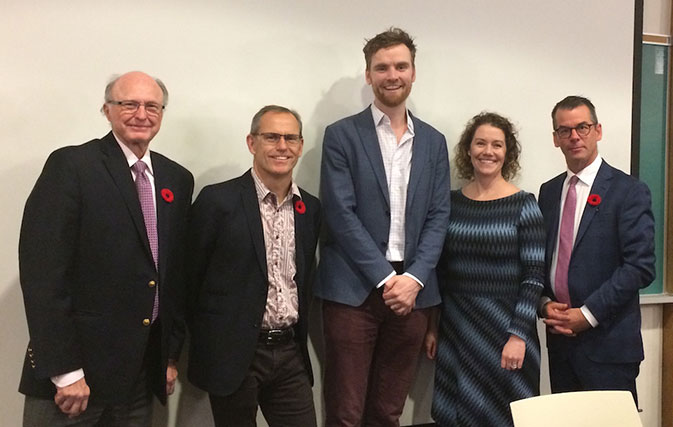TORONTO — Tour operators and travel agents work to keep clients up to date on everything from product quality to in-destination safety. That’s a big job, and there’s a lot of grey area that comes with it, leaving the industry vulnerable to potential legal challenges from disgruntled clients.
Add in the speed, immediacy and potency of social media, allowing travellers to post pictures from their trip and – in the case of negative experiences – have their images and complaints go viral before the tour operator has time to react, and you’ve got a potential powder keg.
Looking to shed some light on the situation, the Canadian Association of Tour Operators (CATO) organized a special session, ‘Trains, Planes and Contracts: Legal Issues in the Travel Industry’, and brought the University of Toronto Law Faculty onboard for an informative presentation.
The event, which took place Nov. 8 at U of T’s Jackman Law Building, was offered to CATO members and invited guests such as representatives from Global Affairs Canada as a member benefit.
The morning closed session for CATO members and invited guests was presented and moderated by Associate Professor Anthony Niblett, Ph D Economics, (Harvard), LLB (Melbourne), with input from officials from U of T’s Global Professional Master of Laws (GPLLM) program. Lunch was sponsored by Globus family of brands.
It’s not new for some travellers to cry foul when a resort isn’t exactly as pictured in the brochure, or for any other grievance. But social media has taken things to a whole new level. “You can be at a resort and take a bunch of photographs and they’re out there immediately, it’s instantaneous,” says CATO Chair, Tim Croyle. “That’s why we see more feedback from guests. It’s easier now.”
Stephanie Bishop, Managing Director, Globus family of brands, agreed. “If something happens on a tour or a cruise, it’s a matter of seconds.” Bishop said travel companies, by necessity, have to be ready to make an immediate response. “We have to be set up that way.”
One of the biggest challenges is the accurate representation of product, in everything from ads to brochures. You want to attract attention and portray product in the best light possible, without making false promises. “It’s a tough middle ground,” says John Feenaghty, Chief Operating Officer, Goway Travel.
With virtual reality (VR), video and 360 room views, “there’s an opportunity to use technology to make clearer what the product is that you’re selling,” says Croyle.
Pierre LePage, CATO’s Executive Director, adds that when clients use technology like VR, “they’ve been in the room, they’ve seen the pool. Short of sleeping in that bed, they’ve virtually been in that hotel already.”
For travel agents, the danger is in over-promising. “Travel agents are the ones selling the product, they’re the ones talking to the client. Travel agents should be doing something very similar to this [contract law info session], to help educate themselves,” said Jeff Element, President, The Travel Corporation – Canada.
Adds CATO Vice-Chair, Brett Walker: “If the travel agent has promised something beyond what the tour operator can deliver, that’s a potential problem.”
Associate Professor Niblett, wrapping up his “101 on contract law”, noted that a lot of law is “looking in the rearview mirror”.
LePage says CATO wanted to organize the contract law info event so that tour operators could come together discuss their concerns. “We were realizing that some competitors were having similar concerns. There’s a commonality there, and there’s value in that. Words really do matter, and it’s about being careful not to overpromise when describing your property or your product in glowing terms, and not going beyond the line.”
Contract law in the travel industry impacts not just what suppliers promise to deliver, but the information coming from clients too. Travel’s not unique in that respect, says Walker, but “there’s a lot of information that’s required from the customer in the travel industry. If you go into buy a car, they don’t ask you for your passport number.”
Adds Walker: “There are a lot of moving parts in this industry. It’s just about thinking like a lawyer and learning to ask the right questions to avoid problems.”

